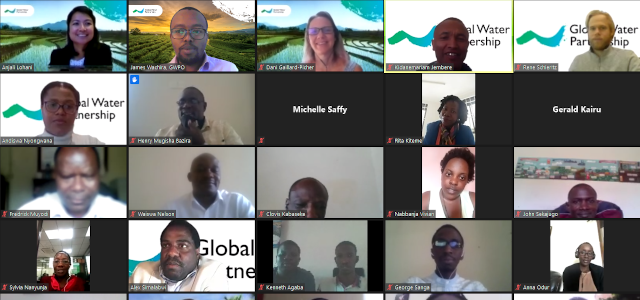GWP provided such support to Zambia, which resulted in the GCF approving, in March 2020, 2.2M USD for Zambia to develop its National Adaptation Plan with GWP as its Delivery Partner. The United Nations Framework Convention on Climate Change (UNFCCC) has urged countries to submit more ambitious national climate plans this year, stating that ‘the Covid crisis has not stopped the climate emergency.’
Opening the workshop, James Kawesi, Assistant Commissioner for Planning at MWE, highlighted key priorities that need immediate addressing – including building capacity to prepare GCF project proposals, outlining its environmental and social safeguards standards, and building institutional structures for financial integrity. Mr. Kawesi expressed appreciation for the longtime partnership between MWE and GWP on strengthening integrated approaches to managing Uganda’s water resources and strengthening climate resilience.
Given the restrictions associated with the COVID-19 pandemic, the workshop took place entirely online. More than 45 participants came from government, academia and research, the private sector, civil society, and NGOs.
Actions to overcome barriers
Over vibrant discussions in small groups, participants discussed barriers that Uganda faces in accessing climate finance from the GCF, proposed actions that could address these barriers, and outlined potential ‘theories of change’ by which these actions could help Uganda become ready to implement GCF-funded projects. A compelling theory of change is a central requirement in a GCF Readiness proposal. GWP has learned that it is important, in the early stages of proposal development, to articulate a theory of change that aligns with country priorities, has solid ownership of a broad range of country stakeholders, and is of high technical quality.
Uganda’s barriers to accessing GCF support identified by participants were about the lack of stakeholder consultation and engagement, and a lack of institutional coordination, when it comes to developing proposals – both were attributed to entities working in silos. For example, a specific barrier is the lack of a process or platform for consolidating and harmonising project ideas in a manner that designates project sponsors and developers clear execution roles. Such a platform would be important to enable Uganda to develop a pipeline of comprehensive, transformational, and inclusive projects with a broad national outlook that are suitable for GCF support.
Another barrier is the lack of a dedicated communications strategy and stakeholder engagement platform between the National Designated Authority (NDA) and stakeholders at national and sub-national levels. Interaction between the NDA and relevant stakeholders across government, private sector, NGOs, civil society, and academia could allow stakeholders to be aware of and to fulfill their roles in developing and implementing GCF projects.
Next steps
Potential solutions that were identified include the development of a national coordination platform with adequate representation of key partners and stakeholders, supported by a clear facilitation mechanism. A mechanism that identifies adaptation needs and mitigation potential that guides the design and prioritisation of projects was identified as a critical step to facilitate project development in Uganda.
Closing the workshop, Mr. Nelson Waiswa from the MWE hailed the collaboration between GWP and MWE and thanked the organisers for bringing together multiple stakeholders to discuss critical barriers that are hindering Uganda from accessing climate finance to increase its adaptive capacity. Mr. Waisa highlighted that it was important to take forward the potential theories of change into actual GCF Readiness proposals to fund much-needed readiness activities.
GWP organised the workshop with technical inputs from MWE and Uganda’s Ministry of Finance, Planning and Economic Development (MFPED). The GCF Secretariat provided technical resources describing the GCF Readiness support programme and access requirements.
Further background:
The Uganda GCF workshop is an activity of the Africa Project Preparation Partnership for GCF Water Concepts. Building climate resilience through water is one of the three anchor areas of Global Water Partnership’s 2020-2025 Strategy. By 2025, GWP aims to support more than 30 countries to access climate finance and to influence the commitment of 1 billion Euros to build resilience via water management and infrastructure investments.
A country’s National Designated Authority (NDA) works in close coordination with key stakeholders including its GCF Direct Access Entities (DAE) to ensure that the country has the necessary institutional and technical capabilities in place to be ‘ready’ to access GCF funds for resilience-building projects. Uganda’s NDA is its Ministry of Finance, Planning and Economic Development (MFPED). MWE is Uganda’s first and only DAE thus far.
Uganda is one of five African countries where GWP is supporting gender transformation via water management, climate resilience, and development (WACDEP-G). WACDEP-G is an initiative under the umbrella of the Africa Water Investment Programme (AIP). Addressing structural gender inequalities is a critical dimension to enabling climate resilience and can be supported by GCF Readiness, not least by ensuring that GCF Direct Access Entities (DAE) social safeguard standards do not exacerbate gender inequalities through GCF projects.
